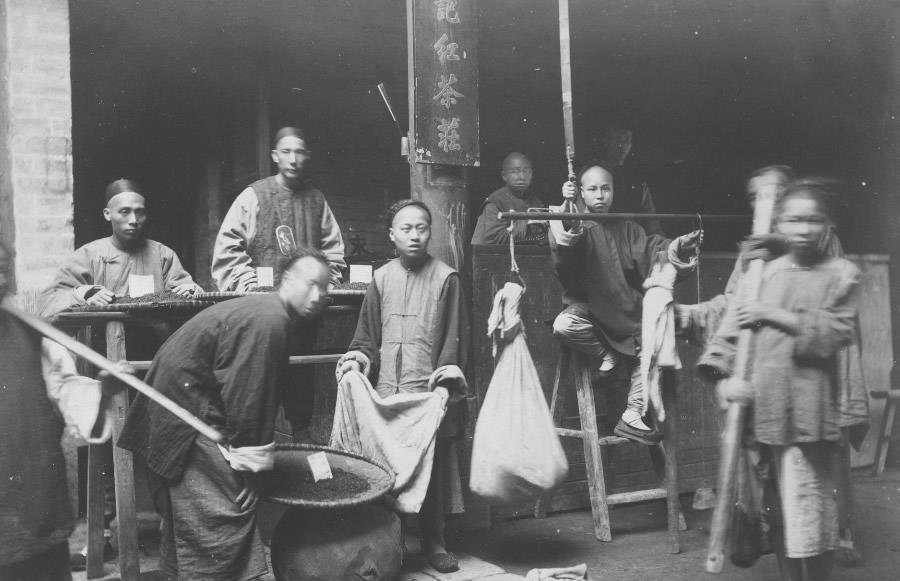"The shadow of the idle cloud pond is leisurely, and the things change stars to move a few degrees in autumn." Time flies, but we can't easily forget. Understanding the past and understanding how we got to the present can help us move toward a better future. Xiaobian arranged 10 photos of the late Qing Dynasty to get to know the people and things in the era of great changes for more than 100 years.

Buying and selling tea.
This is the scene of a tea house buying tea from tea farmers. The one carrying the flat burden is a tea farmer, and the guy at the tea house will grade his tea leaves, give them a price, and then weigh them.
Man with big pigtails.
His big braids were thick and long enough to be the capital of his pride. In fact, so much hair is very troublesome, time-consuming and laborious, he may only freshen up once in 5 days, 10 days, poor hygiene, lice, fleas are inevitable. According to records, men's braids often give off an unpleasant smell.
Group photo of young women.
The set for this photo still seemed quite fashionable at the time, and their costumes and foreign wine on the round table were leading the trend. I'm curious, how do they do it when their hair is neatly combed and clings to their scalps?
In 1909, the construction personnel of the Beijing-Zhang Railway took a group photo.
On the occasion of the completion of the Beijing-Zhang Railway, the personnel involved in the construction took a group photo. Standing on the left are railway engineers, and sitting on the carriages are road builders. The Beijing-Zhangjiakou Railway, which runs from Fengtai in Beijing to Zhangjiakou, is the first railway in China to be funded, designed and built by the Chinese, without foreign participation. According to the "First Second and Third Class Passenger Fare List of the Beijing-Zhangjiang Railway" published in 1910, from Fengtai to Zhangjiakou, the first class seat is eight yuan and seven corners, the second class seat is five yuan eight corners, and the third class seat is two yuan and nine corners.
Zhenguo General Zaifu (middle).
Zaifu (originally known as a strange character, replaced by the variant "Fu") is the son of Yi Li, the Prince of Qing, and is a rare handsome man in the late Qing dynasty royal family, with beautiful eyebrows and handsome handsomeness. Of course, this person is also infected with the vices of the brother of the gongzi, who will only eat, drink and have fun all his life, and he is profligate, and he always has his presence in the casinos and racecourses around Beijing and Tianjin, and he has lost two houses overnight. After Yi Xi's death, he intensified his efforts, spending all his property within a few years, building debts, and finally dying of disgrace.
Child labor at construction sites.
There is a certain danger to work on construction sites, and from the current point of view, parents and foremen are very irresponsible for letting teenage children come here to work. Then again, in that era of widespread poverty, when children had a little strength, they had to go out to work, earn a little ration, and supplement the family.
Female dependents of large families.
Five women sat on the Taishi chair, each dressed in gorgeous clothes (both skirts and pants), with elegant postures, nurturing and temperament. As a female dependent of a large family, from an early age, she will receive etiquette education such as "Female Training" and "Female Commandments", so that her speech and behavior can be disciplined.
Jiujiang Tongzhi, surname Chin (秦?) )。
During the Qing Dynasty, Tongzhi was the deputy of the prefect, Zheng Wupin, and each province had one or two people. It is in charge of local salt, grain, theft, river defense, sea frontier, river engineering and other affairs, and its office is called "Hall".
The area where the Guangdong people live.
Regarded as "untouchables", the people of the people can only live on fishing boats for the rest of their lives, are not allowed to enter any public places, cannot intermarry with people on the shore, and are not allowed to take the imperial examination to enter the career. The Yongzheng Emperor abolished untouchables, but the society still did not really accept the people as commoners. From the photos, the area where they live is crowded and cluttered, and the environment is harsh.
Garden of a gentleman's family in Guangzhou.
From a corner of the garden, it is not difficult to speculate that this gentleman's family is well-to-do, rich in assets, and probably running a large-scale business. The plaque in the hall ,"Juxiaxuan", is derived from the idiom "XuanranXiaju", which means to float high like Yunxia, describing people as handsome and dashing.